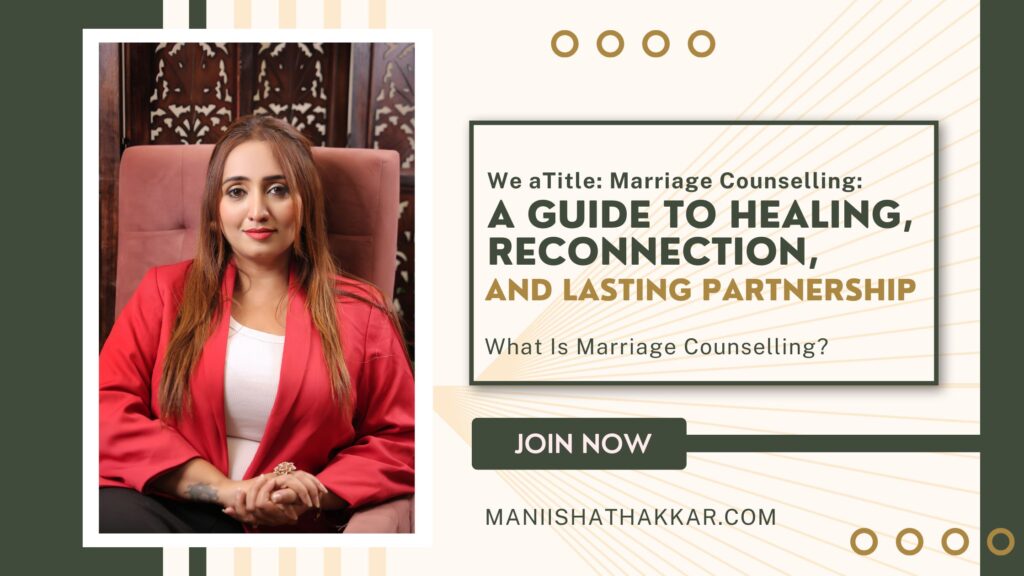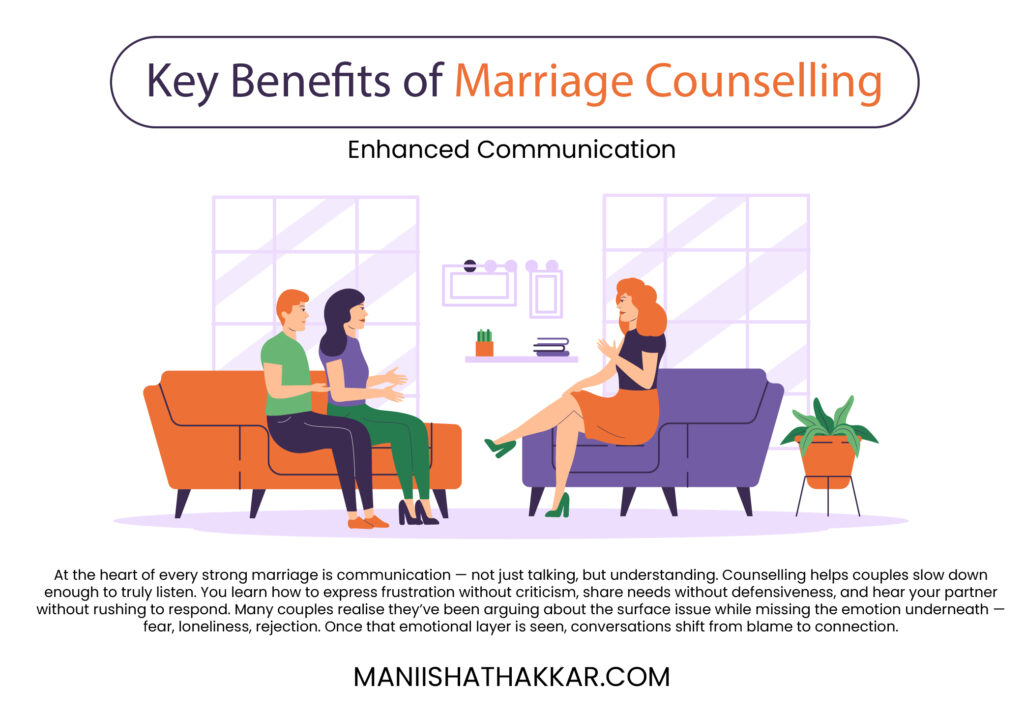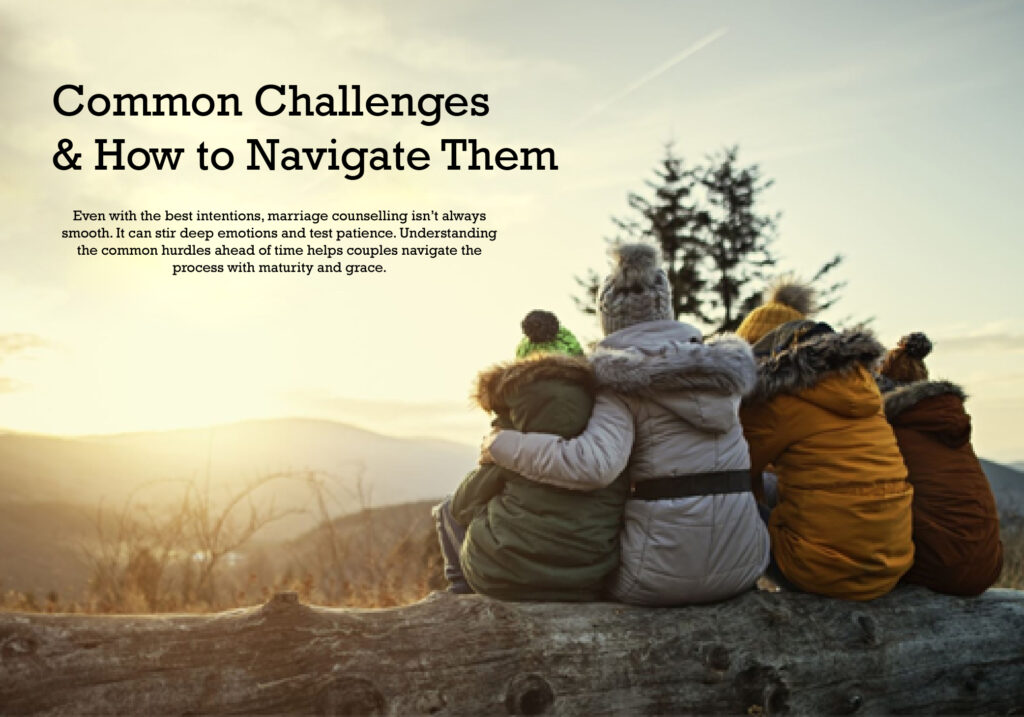
What Is Marriage Counselling ?
Also called couples therapy, marriage counselling is a form of psychotherapy where both partners meet (often together, sometimes individually too) with a therapist trained in relational dynamics. The goal is not to “fix” one person, but to reshape how you relate: your communication, emotional safety, trust, intimacy, and conflict management.
Marriage counselling isn’t only for crises. Many couples seek it proactively to strengthen their bond and prevent issues from worsening.
Why Marriage Counselling Matters ?
Marriage isn’t always the fairy tale we imagine. Over time, communication breaks down, expectations shift, past hurts resurface, and partners drift apart. What this really means is: it’s normal for a relationship to hit rough patches. But when couples lack tools or haven’t created space to heal, the cracks can widen.
Counselling offers that space and those tools. A skilled therapist can act as a guide, helping couples see blind spots, understand each other’s inner worlds, and build healthier patterns of connection.
When Should Couples Consider It ?
Here are signals that counselling may be needed:
- Persistent resentment, anger, or criticism
- Repeated arguments over the same themes
- Emotional distance, withdrawal, or feeling lonely in the marriage
- Trust broken by infidelity, secrets, deception
- Major life transitions (career change, childbirth, relocation)
- Discrepancies in values, expectation, intimacy
- You feel stuck—unsure how to move forward
- You want to deepen connection, not just patch things up
Research suggests many couples wait years before seeking help. According to John Gottman, couples often delay for about six years of unhappiness before reaching out.
How the Counselling Process Works
Initial Sessions & Intake
Counsellors usually begin with an intake: each partner shares history, goals, conflicts, family background, and what they hope to change. This helps the therapist tailor the plan.
Intervention Methods
There’s no one-size-fits-all approach. Some common methods:
- Emotionally Focused Therapy (EFT): helps partners connect beneath conflict.
- Gottman Method: rooted in empirical research, focuses on communication, repair, building friendship, and shared meaning.
- Cognitive Behavioral Couples Therapy (CBCT): explores how thoughts and beliefs affect reactions.
- Imago Therapy, Narrative Therapy, Solution-Focused Brief Therapy—these, among others, may be integrated depending on the couple’s needs.
Homework & Reinforcement
Counselling isn’t just what happens in sessions. Therapists often give “homework” — communication exercises, check-ins, reflective journaling — so couples practice the new skills in real life
Key Benefits of Marriage Counselling

1. Enhanced Communication
At the heart of every strong marriage is communication — not just talking, but understanding. Counselling helps couples slow down enough to truly listen. You learn how to express frustration without criticism, share needs without defensiveness, and hear your partner without rushing to respond. Many couples realise they’ve been arguing about the surface issue while missing the emotion underneath — fear, loneliness, rejection. Once that emotional layer is seen, conversations shift from blame to connection.
Therapists use structured techniques such as “reflective listening” or “I-statements” to build emotional safety. Over time, this becomes second nature. The aim isn’t to remove disagreement, but to learn how to stay connected through it.
2. Rebuilding or Deepening Trust
Trust isn’t built once; it’s maintained daily. When it’s broken — through betrayal, secrecy, or neglect — the emotional wound runs deep. Counselling creates a safe space to unpack what happened and why. The therapist guides both partners through repair: acknowledging hurt, taking accountability, rebuilding transparency, and creating boundaries that protect the relationship moving forward.
Even when trust hasn’t been “broken,” it can still be deepened. Vulnerability — sharing fears, failures, and insecurities — is a key ingredient of emotional intimacy. A skilled counsellor helps couples feel safe enough to let those walls down and reconnect at a more authentic level.
3. Managing Conflict Constructively
Disagreement isn’t the enemy; how you handle it is. Many couples fall into predictable patterns — one partner pursues, the other withdraws; one attacks, the other shuts down. Counselling helps identify these patterns so you can step out of them rather than repeat them.
You learn how to pause before reacting, validate your partner’s perspective, and find solutions rather than winning arguments. The goal is not to avoid conflict, but to transform it into dialogue. Healthy conflict can actually strengthen a marriage — it shows both people care enough to engage and grow.
4. Reviving Emotional & Physical Intimacy
Intimacy often fades quietly, replaced by routine, stress, or unspoken resentment. Counselling helps couples rediscover emotional closeness — the kind that leads to natural physical connection. When emotional safety is restored, affection and desire return more organically.
Therapists may introduce exercises to rebuild non-sexual closeness first — eye contact, appreciation rituals, shared moments of touch or gratitude — which gradually reignite deeper intimacy. It’s about learning to see each other again, not as roommates or co-parents, but as partners in love.
5. Aligning on Values, Goals & Expectations
Many marital tensions come not from lack of love, but from unspoken misalignments — how to handle money, raise children, divide responsibilities, or pursue careers. Counselling brings these conversations into the open, helping couples define a shared vision.
You learn to negotiate differences respectfully and set practical agreements. A therapist helps uncover the emotional meaning behind each stance — for instance, one partner’s strictness with money may come from fear of instability, not control. Once those roots are seen, empathy replaces resentment.
Alignment doesn’t mean sameness; it means understanding each other’s “why” and finding middle ground that honors both perspectives.
6. Healing from Trauma, Betrayal, or Past Wounds
Unresolved pain from childhood, past relationships, or trauma often shows up in marriage — through mistrust, reactivity, or emotional distance. Counselling helps bring these hidden wounds into awareness, so they stop running the show unconsciously.
When guided safely, couples can witness each other’s pain without judgment. That experience — of being seen and accepted even in brokenness — becomes deeply healing. Over time, the marriage itself becomes a place of restoration, not re-injury.
In cases of betrayal or infidelity, counselling provides structure for rebuilding honesty, forgiveness, and renewed emotional boundaries. It’s a process, not a quick fix, but it allows both partners to choose healing consciously.
7. Preventative Care — Before It’s “Too Late”
Marriage counselling isn’t only for relationships in crisis. In fact, the healthiest couples treat it as maintenance — a way to keep emotional connection strong as life evolves. Just as you’d see a doctor for a regular health check, couples can benefit from periodic sessions to recalibrate and stay aligned.
Preventative counselling helps spot early signs of disconnection: silence replacing curiosity, assumptions replacing empathy, stress eroding closeness. Addressing these early can save years of frustration later. A good marriage doesn’t happen by accident; it’s built intentionally. Counselling provides the map, tools, and perspective to make that work more meaningful and lasting.
Common Challenges & How to Navigate Them

Even with the best intentions, marriage counselling isn’t always smooth. It can stir deep emotions and test patience. Understanding the common hurdles ahead of time helps couples navigate the process with maturity and grace.
1. Resistance or Skepticism
Sometimes one partner is enthusiastic while the other shows up with arms crossed — skeptical of whether therapy “actually works.” This resistance often hides fear: fear of being blamed, of change, or of facing old wounds.
The key is patience, not pressure. Forcing engagement rarely helps. Instead, the counsellor focuses on creating emotional safety and neutrality — proving that therapy isn’t about taking sides but about helping both partners be understood. As trust builds, even the hesitant partner usually opens up. Transparency about the process and what to expect can also reduce anxiety.
2. Emotional Pain Surfacing
Counselling can feel like opening a door you’ve kept shut for years. Pain, anger, or grief may come rushing out — sometimes more than either partner expected. That’s not failure; it’s progress. Healing requires feeling.
A skilled therapist ensures this is done safely — grounding each partner, slowing the pace when needed, and helping you process emotions instead of being consumed by them. Couples who stay with the process often find that once the storm passes, there’s clarity and connection on the other side.
3. Unequal Effort
One spouse may dive into self-reflection while the other stays guarded. That imbalance can create frustration — “Why am I doing all the work?” But change in one person often ripples into the relationship. The more self-aware partner can model new behaviors, shifting the tone of interactions.
The therapist helps set realistic expectations and ensures accountability on both sides. Progress looks different for each person. What matters is movement, not perfect symmetry.
4. Relapse into Old Habits
Even after major breakthroughs, couples sometimes slip back into old patterns — snapping, shutting down, stonewalling. That’s human. The goal isn’t to never fight again, but to recover faster and communicate better next time.
Therapists often revisit these moments as learning opportunities. Instead of shame or frustration, couples are encouraged to notice triggers, talk about what went wrong, and practice repair. Every setback, if handled consciously, becomes a step toward deeper understanding.
5. Therapist Mismatch
Not every counsellor will feel like the right fit — and that’s okay. The therapeutic relationship itself is a big part of healing. If you or your partner feel unheard or uncomfortable, it’s perfectly acceptable to seek another professional.
The right therapist is someone both partners feel safe with — someone who challenges without judging, listens deeply, and adapts to your unique dynamic. Think of it as finding the right guide for a long, meaningful journey.
FAQs
Q: Will counselling always save a marriage?
A: No guarantee. Some couples grow apart. But counselling can help each partner make an informed, compassionate decision, whether that’s healing together or ending with dignity.
Q: How many sessions will it take?
A: It varies. Some couples find meaningful shifts in 8–12 sessions; others continue longer. It depends on the issues, openness, consistency, and complexity of the relationship.
Q: Is it okay if only one spouse wants to attend?
A: Yes. Many therapists accept that. But the work will be limited if one partner refuses engagement. The willing partner can still grow and influence the relationship dynamic.
Q: Can we do this online?
A: Absolutely. Especially in current times, many therapists offer tele-therapy. It’s effective when both partners commit to presence, honesty, and good connection.
Q: What if I don’t want the therapist taking sides?
A: A good marriage counsellor remains neutral to the couple’s relationship, not supporting one over the other. Their role is to help both partners be heard, not judge.
Q: How do I pick the right counsellor?
A: Look for someone experienced in couples work, whose style resonates with both of you, and someone you feel safe sharing with. Trust and rapport matter most.
